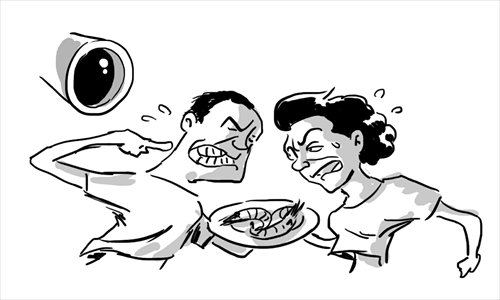Remain on guard against mass media’s ability to perpetuate stereotypes

Recently, news that a young couple in Shanghai almost got divorced following an argument over who ate more shrimp at home triggered fierce discussion online. This led to comments such as "This is typical Shanghainese, very mean," or "It is understandable that this happened in Shanghai."
Here's a small test: Ask a Chinese what he thinks of the Shanghainese and what he thinks about Henan locals.
If the interviewee had never lived in Shanghai or Henan before, it is quite possible he would say the Shanghainese are always mean, and Shanghai men are sissies. As for Henan people, he may have the impression they are untrustworthy and creepy.
In fact, people exaggerate these impressions they get from the media, gossip or other sources.
The media only shows you what journalists deem important. They create the interest, and the stereotype.
There are so many things happening every day, but only a small number are reported. How is this news selected? And how do reporters write about it?
The mass media recognizes that its audience will only give much of their attention to a few messages, and they like to keep messages eye-catching. So the first rule is to keep them simple. And the second rule is to repeat what has worked in the past.
The media also wants you to come back for more. So the third rule is to use words that create a little agitation so that people will talk about it, and maybe write letters to the editor.
Back to the news mentioned at the beginning, it is more eye-catching to add "Shanghai" to the headline, because this fits in with what people usually think of the Shanghainese.
It is the way we process the information we receive and the things we tend to believe that influence or decide how mass media chooses and reports the news.
Stereotypes exaggerating geographical bias are obvious, but there are other forms of stereotypes which are less visible, but subconsciously influence the way we behave.
We like to think of ourselves as individuals, but we also know that we are part of certain groups. The world is full of people who look around and categorize others as being "us" or "them," which serves as a fertile source for stereotypes that the media can use.
The media has become responsible for the shaping and influencing of our identities, because we are constantly surrounded by the media, and allow it to change the way we act and think.
Mainstream media creates images which, though almost impossible to imitate, young people strive to become. When a young girl sees a magazine with a model on the cover, she won't be thinking about the fact that the model has a makeup artist, but about how to look the same.
Teenage girls have been brainwashed by the media to believe that they have to look thin and beautiful, wear expensive dresses and put on makeup and that they have to fit this idealized image, or they won't be happy or be loved.
Half of our identities today are based on what we see in the media.
Although our names and cultures are determined in other ways, our dress, behavior and hobbies are all determined by mainstream media.
What we see in magazines and on television dictate the way we run our lives. They say that we need this car, that dress, those games, because they're what's "in."
The media is the cause of our consumerist society, and is always telling us "what's hot and what's not." We always want what's trendy and what's new, because the media tells us that we want it. This both destroys individualism, and influences our identity.
No one can escape from media, but you can be aware that they are feeding your thoughts.
The author is a freelance writer based in Shanghai. opinion@globaltimes.com.cn